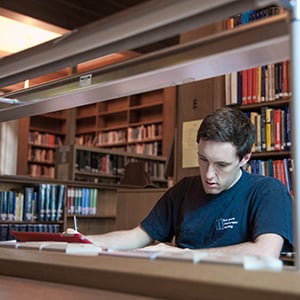
English Language and Literature
Course overview
UCAS code: Q300
Entrance requirements: AAA
Course duration: 3 years (BA)
Subject requirements
Required subjects: English Literature or English Language and Literature
Recommended subjects: Not applicable
Helpful subjects: A language, History
Other course requirements
Admissions tests: None
Written Work: One piece
Admissions statistics*
Interviewed: 67%
Successful: 22%
Intake: 208
*3-year average 2023-25
Contact
Tel: +44 (0) 1865 271055
Email: [email protected]
Unistats information for this course can be found at the bottom of the page
Please note that there may be no data available if the number of course participants is very small.
About the course
The English Language and Literature course at Oxford is one of the broadest in the country, giving you the chance to study writing in English from its origins in Anglo-Saxon England to the present.
As well as British literature, you can study works written in English from other parts of the world, and some originally written in other languages, allowing you to think about literature in English in multilingual and global contexts across time.
The course allows you a considerable degree of choice, both in developing your personal interests across core papers, and in choosing a topic for your dissertation and for a special option in your final year.
Options have included:
- Literature and revolution
- Postcolonial literature
- Writing lives
- Old Norse
- Tragedy
- Film criticism.
Studying literature at Oxford involves the development of sophisticated reading skills and of an ability to place literary texts in their wider intellectual and historical contexts. It also requires you to:
- consider the critical processes by which you analyse and judge
- learn about literary form and technique
- evaluate various approaches to literary criticism and theory
- study the development of the English language.
The Oxford English Faculty is the largest English department in Britain. Students are taught in tutorials by a scholar active in their research field, many of whom also give lectures to all students in the English Faculty. You will therefore have the opportunity to learn from a wide range of specialist teachers.
Library provision for English at Oxford is exceptionally good. All students have access to the Bodleian Library (with its extensive manuscript collection), the Humanities Library, their own college libraries and a wide range of electronic resources.
In your first year, you will be introduced to the conceptual and technical tools used in the study of language and literature, and to a wide range of different critical approaches. At the same time, you will be doing tutorial work on early medieval literature, Victorian literature and literature from 1910 to the present.
In your second and third years, you will extend your study of English literary history in four more period papers ranging from late medieval literature to Romanticism. These papers are assessed by three-hour written examinations at the end of your third year. You will also produce:
- a portfolio of three essays on Shakespeare, on topics of your choice
- an extended essay (or occasionally an examination) relating to a special options paper, chosen from a list of around 25 courses
- and an 8,000-word dissertation on a subject of your choice.
Submitted work will constitute almost half of the final assessment for most students.
Alternatively, in the second and third years, you can choose to follow our specialist course in Medieval Literature and Language, with papers covering literature in English from 650-1550 along with the history of the English language up to 1800, with a further paper either on Shakespeare or on manuscript and print culture. Students on this course also take a special options paper and submit a dissertation on a topic of their choice.
Astrophoria Foundation Year
If you’re interested in studying English but your personal or educational circumstances have meant you are unlikely to achieve the grades typically required for Oxford courses, then choosing to apply for English with a Foundation Year might be the course for you.
Visit our Foundation Year course pages for more details.
 |  |  |
'The real value of Oxford’s English course is its sheer scope, stretching from Beowulf to Virginia Woolf and beyond. Being guided through all the different ages of English literature means you explore periods and styles you may otherwise have rejected out of hand, discover brand new tastes, and even more levels to your love of literature! The ability to sit and read some of the greatest works of prose, poetry and performance in a city steeped in its own near-mythological wealth of history and beautiful architecture gives you a sense of being lost in your own fantasy, your own realm of turrets, tutors and texts.' Jack | 'I never really had any doubt I wanted to study English. The course here is so broad, I feel like I'm learning about things I would never have thought to do on my own. The best thing is probably the amount of freedom we get; we choose which lectures we want to go to, which texts to focus on, and mostly even choose our own essay questions. It means from the start you really get to explore your own interests, but your tutors make sure you're still preparing for broader exam questions through these.' Alice | '[The best thing about the course was] the freedom I had to direct my own studies, from choosing the books I wanted to write on, to developing my own specific area of focus within them. The course was a completely different learning experience from school because I was given the freedom to really work out what I thought about texts without having to worry about meeting assessment objectives or covering key themes. I've left Oxford knowing that I've really explored why I love literature so much and that I've contributed something individual to the study of literature, even if it ends up being just read by me.' Emma |
Unistats information
Discover Uni course data provides applicants with Unistats statistics about undergraduate life at Oxford for a particular undergraduate course.
Please select 'see course data' to view the full Unistats data for English Language and Literature.
Please note that there may be no data available if the number of course participants is very small.
Visit the Studying at Oxford section of this page for a more general insight into what studying here is likely to be like.
English Language and Literature
A typical week
Although details of practice vary from college to college, most students will have one or two tutorials (usually two students and a tutor) and one or two classes (in groups of around 8 to 10) each week. A tutorial usually involves discussion of an essay, which you will have produced based on your own reading and research that week. You will normally be expected to produce between eight and twelve pieces of written work each term. Most students will also attend several lectures each week.
Tutorials are usually 2-3 students and a tutor. Class sizes may vary depending on the options you choose. In college, there would usually be 6-12 students and in the department there would usually be no more than 15 students. There might be specific circumstances in which some classes contain around 20 students.
Most tutorials, classes, and lectures are delivered by staff who are tutors in their subject. Many are world-leading experts with years of experience in teaching and research. Some teaching may also be delivered by postgraduate students who are usually studying at doctoral level.
To find out more about how our teaching year is structured, visit our Academic Year page.
Course structure
Year 1
Courses | Assessment |
|---|---|
Four papers are taken:
| Three written papers form the First University Examination, together with a submitted portfolio of two essays for Introduction to English language and literature. All exams must be passed, but marks do not count towards the final degree. |
Year 2
Courses |
|---|
|
Year 3
Courses | Assessment |
|---|---|
| All period papers will be examined by final written examinations at the end of the third year. Most students will submit one extended essay for Special options, due in at the end of the first term; dissertation and portfolio for Shakespeare/The material text, due during the second term. |
The content and format of this course may change in some circumstances. Read further information about potential course changes.
Academic Requirements
Qualification | Requirement |
|---|---|
A-levels: | AAA |
Advanced Highers: | AA/AAB |
International Baccalaureate (IB): | 38 (including core points) with 666 at HL |
Any other equivalent qualification: | View information on other UK qualifications, and international qualifications. |
Wherever possible, your grades are considered in the context in which they have been achieved.
Read further information on how we use contextual data.
Subject requirements
Essential: | Candidates are expected to have English Literature, or English Language and Literature to A-level, Advanced Higher, Higher Level in the IB or any other equivalent. |
|---|---|
Helpful: | A language or History can be helpful to students in completing this course, although they are not required for admission. |
If a practical component forms part of any of your science A‐levels used to meet your offer, we expect you to pass it.
If English is not your first language you may also need to meet our English language requirements.
Please note that creative writing qualifications, regardless of awarding body, are not accepted and will not help you meet the academic requirements for this course.
If your personal or educational circumstances have meant you are unlikely to achieve the grades listed above for undergraduate study, but you still have a strong interest in the subject, then applying for English with a Foundation Year might be right for you.
Visit the Foundation Year course pages for more details of academic requirements and eligibility.
Applying
All candidates must follow the application procedure as shown on our Applying to Oxford pages.
The following information gives specific details for students applying for this course.
Admissions test
You do not need to take a written test as part of an application for this course.
Written work
Description: | As part of your application, you must send us a sample of your written work. If you are at school or college, this essay should be:
You are welcome to send us any English Literature work that meets the requirements listed above. This could be a timed essay, a critical commentary, or an excerpt of your coursework or EPQ. Work can be handwritten or typed – either is fine. When you send us your work, please be sure to include a cover sheet. On the cover sheet you should describe the circumstances under which your work was produced. You and your teacher must both fill in this form. Tutors will take into account the information you give on your cover sheet when assessing your work. You’re welcome to submit an excerpt from a longer piece if you think it represents your best work. If so, please add a note on the cover sheet to explain the context of the excerpt. If you are a post-qualification or mature applicant, you can decide (although it is not necessary) to produce a new piece of work, as you may want to give a clearer reflection of your current abilities. We understand that this means it may not be possible to have this piece of work marked, so please use the cover sheet to detail the circumstances in which the work was produced. For full guidance on selecting and submitting your written work, please visit the English website. |
|---|---|
Submission deadline: | 10 November 2026 |
Visit our written work page for general guidance and to download the cover sheet.
What are tutors looking for?
Successful candidates will give evidence of wide, engaged, and thoughtful reading.
Written work helps us to gauge your analytical skills and your writing.
Interviews allow us to explore your enthusiasm for literature, your response to new ideas and information and your capacity for independent thought. We are not looking for any particular reading, or particular answers: we are interested in your ideas and in how you engage with literature.
Shortlisted candidates may also be asked to discuss an unseen piece of prose or verse given to you before or in the interview. Tutors appreciate that you may be nervous, and will try to put you at ease.
Visit the English website for more detail on the selection criteria for this course.
Careers
Our students go on to succeed in a very wide range of careers: the analytical and communication skills that develop during this course equip them for many different paths.
Popular careers and fields include:
- the law
- advertising
- acting
- publishing
- politics
- teaching
- librarianship
- public relations
- journalism
- writing
- further research
- management consultancy
- finance.
The Telling Our Stories Better project ran throughout 2021, bringing together alumni and current students of the English Faculty to talk about their time at Oxford and their career paths. Led by Dr Sophie Ratcliffe and Dr Ushashi Dasgupta, and managed by Dr Dominique Gracia, Stories aims to challenge misconceptions about who studies English and the career paths they take.
We don't want anyone who has the academic ability to get a place to study here to be held back by their financial circumstances. To meet that aim, Oxford offers one of the most generous financial support packages available for UK students and this may be supplemented by support from your college.
Fees
Please note that for full-time Home undergraduate students, current university policy is to charge fees at the level of the cap set by the government, which for 2026/27 is £9,790. For details of annual increases, please see our guidance on likely increases to fees and charges. In the 2027/28 academic year course fees for Home fee status students will rise to £10,050 (in line with the government fee cap).
Fee status | Annual Course fees |
| Home | £9,790 |
| Overseas | £43,600 |
Further details about fee status eligibility can be found on the fee status webpage.
For more information please refer to our course fees page. Fees will usually increase annually. For details, please see our guidance on likely increases to fees and charges.
Living costs
Living costs at Oxford might be less than you’d expect, as our world-class resources and college provision can help keep costs down.
Living costs for the academic year starting in 2026 are estimated to be between £1,405 and £2,105 for each month you are in Oxford. Our academic year is made up of three eight-week terms, so you would not usually need to be in Oxford for much more than six months of the year but may wish to budget over a nine-month period to ensure you also have sufficient funds during the holidays to meet essential costs. For further details please visit our living costs webpage.
Financial support
Home | A tuition fee loan is available from the UK government to cover course fees in full for Home (UK, Irish nationals and other eligible students with UK citizens' rights - see below*) students undertaking their first undergraduate degree**, so you don’t need to pay your course fees up front. In 2026 Oxford is offering one of the most generous bursary packages of any UK university to Home students with a family income of around £50,000 or less, with additional opportunities available to UK students from households with incomes of £32,500 or less. The UK government also provides living costs support to Home students from the UK and those with settled status who meet the residence requirements. *For courses starting on or after 1 August 2021, the UK government has confirmed that EU, other EEA, and Swiss Nationals will be eligible for student finance from the UK government if they have UK citizens’ rights (i.e. if they have pre-settled or settled status, or if they are an Irish citizen covered by the Common Travel Area arrangement). The support you can access from the government will depend on your residency status. |
Islands | Islands students are entitled to different support to that of students from the rest of the UK. Please refer the links below for information on the support to you available from your funding agency: |
Overseas | Please refer to the "Other Scholarships" section of our Oxford Bursaries and Scholarships page. |
**If you have studied at undergraduate level before and completed your course, you will be classed as an Equivalent or Lower Qualification student (ELQ) and won’t be eligible to receive government or Oxford funding
Additional Fees and Charges Information for English Language and Literature
There are no compulsory costs for this course beyond the fees shown above and your living costs.
Contextual information
Unistats course data from Discover Uni provides applicants with statistics about a particular undergraduate course at Oxford. For a more holistic insight into what studying here is likely to be like, please view the information below and explore our website more widely.
The Oxford tutorial
College tutorials are central to teaching at Oxford. Typically, they take place in your college and are led by your academic tutor(s) who teach as well as do their own research. Students will also receive teaching in a variety of other ways, depending on the course. This will include lectures and classes, and may include laboratory work and fieldwork. However, tutorials offer a level of personalised attention from academic experts unavailable at most universities.
During tutorials (normally lasting an hour), college subject tutors will give you and one or two tutorial partners feedback on prepared work and cover a topic in depth. The other student(s) in your tutorials will typically be doing the same course as you and covering the same topic. Such regular and rigorous academic discussion develops and facilitates learning in a way that isn’t possible through lectures alone. Tutorials also allow for close progress monitoring so tutors can quickly provide additional support if necessary.
Read more about tutorials and an Oxford education
College life
Our colleges are at the heart of Oxford’s reputation as one of the best universities in the world.
- At Oxford, everyone is a member of a college as well as their subject department(s) and the University. Students therefore have both the benefits of belonging to a large, renowned institution and to a small and friendly academic community. Each college or hall is made up of academic and support staff, and students. Colleges provide a safe, supportive environment leaving you free to focus on your studies, enjoy time with friends and make the most of the huge variety of opportunities.
- Each college has a unique character, but generally their facilities are similar. Each one, large or small, will have the following essential facilities:
- Porters’ lodge (a staffed entrance and reception)
- Dining hall
- Lending library (often open 24/7 in term time)
- Student accommodation
- Tutors’ teaching rooms
- Chapel and/or music rooms
- Laundry
- Green spaces
- Common room (known as the JCR).
- All first-year students are offered college accommodation either on the main site of their college or in a nearby college annexe. This means that your neighbours will also be ‘freshers’ and new to life at Oxford. This accommodation is guaranteed, so you don’t need to worry about finding somewhere to live after accepting a place here, all of this is organised for you before you arrive.
- All colleges offer at least one further year of accommodation and some offer it for the entire duration of your degree. You may choose to take up the option to live in your college for the whole of your time at Oxford, or you might decide to arrange your own accommodation after your first year – perhaps because you want to live with friends from other colleges.
- While college academic tutors primarily support your academic development, you can also ask their advice on other things. Lots of other college staff including welfare officers help students settle in and are available to offer guidance on practical or health matters. Current students also actively support students in earlier years, sometimes as part of a college ‘family’ or as peer supporters trained by the University’s Counselling Service.
Connect with us
Outreach programmes and events
Many academic departments and faculties at Oxford have dedicated outreach events and activities aimed at promoting their subject area(s) and supporting talented students from all backgrounds to apply to their courses.
University-wide events and resources
In addition to exploring department-run activities, we recommend checking out the outreach event calendar for upcoming University-wide events and other subject and college activities.
Subject-specific resources supporting supercurricular engagement for all ages can also be found via the University's Digital Resource Hub, suggested subject resources webpage and Oxplore, our online learning platform for 11-to-18-year-olds.
UK state school students interested in this or similar courses may like to explore UNIQ, Oxford's free flagship outreach programme for students in their first year of further education. UNIQ offers a choice of academic residentials in over 30 courses and each year provides around 1,500 students with the opportunity to experience Oxford's teaching, explore student life and receive expert support with their application to university.
Prospective applicants can sign up to receive step-by-step support with their Oxford application.
Read more about Oxford's widening access initiatives and other ways to connect with us before applying.

